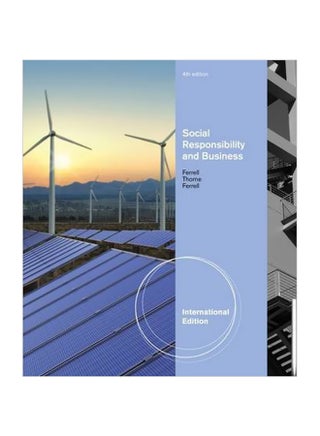Free & Easy Returns
Best Deals



| Publisher | Cengage Learning, Inc |
| Book Format | Paperback |
| Book Description | Social Responsibility and Business, 4e, International Edition introduces a strategic social responsibility framework for courses that address the role of business in society. Social responsibility is presented as the extent to which a business adopts a strategic focus for fulfilling the economic, legal, ethical, and philanthropic responsibilities expected by all its stakeholders. In this fourth edition, the authors present the most up-to-date findings in the field, describe best practices, encourage student decision-making, provide cutting-edge cases, and inspire the application of social responsibility principles to a variety of situations and organizations. The soft cover format is affordable to students and provides more opportunities for instructors to supplement the course content or to further customize the content to meet their needs. Additionally, a comprehensive teaching and learning package ensures that business students understand and appreciate concerns about business ethics, social auditing, corporate social responsibility, corporate governance, sustainability, and a host of other factors involving a global perspective for today's business leaders. |
| About the Author | O.C. Ferrell ist Professor für Marketing und Mitarbeiter für kreative Businessstrategien an der Anderson Schule für Management sowie der Universität New Mexiko. Linda Ferrell ist Professorin für Marketing und Mitarbeiterin für kreative Businessstrategien an der Universität New Mexico. |
| Publication Date | 13-Apr-10 |
| Author | Debbie Thorne McAlister |
| Language | English |
| Editorial Review | Note: Each chapter concludes with a Summary, Key Terms, Responsible Business Debate, Discussion Questions, an Experiential Exercise, and "What Would You Do?" minicase. 1. SOCIAL RESPONSIBILITY FRAMEWORK. Social Responsibility Defined. Development of Social Responsibility. Global Nature of Social Responsibility. Global Initiatives: International Business and Poverty Reduction. Benefits of Social Responsibility. Framework for Studying Social Responsibility. 2. STRATEGIC MANAGEMENT OF STAKEHOLDER RELATIONSHIPS. Stakeholders Defined. Stakeholder Issues and Interaction. Performance with Stakeholders. Development of Stakeholder Relationships. Implementing a Stakeholder Perspective in Social Responsibility. Link Between Stakeholder Relationships and Social Responsibility. 3. CORPORATE GOVERNANCE. Corporate Governance Defined. History of Corporate Governance. Corporate Governance and Social Responsibility. Issues in Corporate Governance Systems. Corporate Governance Around the World. Future of Corporate Governance. 4. LEGAL, REGULATORY, AND POLITICAL ISSUES. Government's Influence on Business. Business's Influence on Government and Politics. The Government's Strategic Approach for Legal and Ethical Compliance. 5. BUSINESS ETHICS AND ETHICAL DECISION MAKING. The Nature of Business Ethics. Foundations of Business Ethics. Ethical Issues in Business. Understanding the Ethical Decision-Making Process. 6. STRATEGIC APPROACHES TO IMPROVING ETHICAL BEHAVIOR. The Need for Organizational Ethics Programs. Codes of Conduct. Ethics Officers. Ethics Training and Communication. Establishing Systems to Monitor and Enforce Ethical Standards. Continuous Improvement of the Ethics Program. Implementing Organizational Ethics Programs. 7. EMPLOYEE RELATIONS. Employee Stakeholders. Responsibilities to Employees. Strategic Implementation of Responsibilities to Employees. 8. CONSUMER RELATIONS. Consumer Stakeholders. Responsibilities to Consumers. Strategic Implementation of Responsibilities to Consumers. 9. COMMUNITY RELATIONS AND STRATEGIC PHILANTHROPY. Community Stakeholders. Responsibilities to the Community. Corporate Philanthropy. Strategic Philanthropy Defined. Strategic Philanthropy and Social Responsibility. Stakeholders in Strategic Philanthropy. Implementation of Strategic Philanthropy. 10. TECHNOLOGY ISSUES. The Nature of Technology. Technology's Influence on the Economy. Technology's Influence on Society. Strategic Implementation of Responsibility for Technology. 11. SUSTAINABILITY ISSUES. Global Environmental Issues. Environmental Policy and Regulation. Alternative Energy. Business Response to Sustainability Issues. Strategic Implementation of Environmental Responsibility. 12. SOCIAL RESPONSIBILITY IN A GLOBAL ENVIRONMENT. Cultural Intelligence. Global Stakeholders. National Competitiveness. Global Development. Global Reporting Initiative. Cases: 1. Monsanto Attempts to Balance Stakeholder Interests. 2. Wal-Mart: The Future Is Sustainability. 3. The American Red Cross. 4. Countrywide Financial: The Subprime Meltdown. 5. Coping with Financial and Ethical Risks at American International Group (AIG). 6. Starbucks' Mission: Social Responsibility and Brand Strength. 7. The Fraud of the Century: The Case of Bernard Madoff. 8. Nike: Managing Ethical Missteps Sweatshops to Leadership in Employment Practices. 9. Banking Industry Meltdown: The Ethical and Financial Risks of Derivatives. 10. The Coca-Cola Company Struggles with Ethical Crises. 11. Enron: Questionable Accounting Leads to Collapse. 12. BP (Beyond Petroleum) Focuses on Sustainability. 13. Tyco International: Leadership Crisis. 14. Mattel Responds to Ethical Challenges. 15. Home Depot Implements Stakeholder Orientation. 16. New Belgium Brewing: Ethical and Environmental Responsibility. |
| Edition Number | 4 |
| Number of Pages | 704 |

